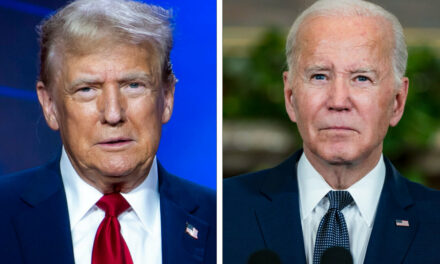We support our Publishers and Content Creators. You can view this story on their website by CLICKING HERE.
President-elect Donald Trump is expected to ring the NYSE opening bell on Dec. 12, marking a high-profile return to New York.
President-elect Donald Trump will mark the ceremonial start of trading at the New York Stock Exchange (NYSE) on Dec. 12 by ringing the opening bell, The Epoch Times has learned.
The planned ringing of the opening bell, which had not been officially announced at the time of reporting, will be a high-profile event for Trump, a born-and-bred New Yorker who left the city during his presidency to establish residency in Florida.
Trump’s return to New York will likely garner significant attention, as did former President Ronald Reagan’s ringing of the opening bell, which in 1985 marked the first time a sitting U.S. president performed the ceremonial gesture. While Trump’s wife, former and future First Lady Melania Trump, performed the honor during his first term in office to promote her “Be Best” initiative, it will be a first for the president-elect.
Plans for the ceremony follow a significant post-election surge in U.S. stock markets, reflecting investor optimism over Trump’s economic policies.
On Nov. 5, the benchmark S&P 500 experienced its best day in nearly two years, rallying 2.5 percent, while the Dow Jones Industrial Average soared 1,508 points, or 3.6 percent. The Nasdaq composite also posted impressive gains, contributing to record-breaking highs across all three Wall Street indexes. Market analysts widely attribute the rally to expectations of pro-business policies under the incoming Trump administration, including lower taxes and deregulation.
Throughout the 2024 presidential campaign, Trump pledged to curb federal regulations that he said limit the creation of new U.S. jobs. He has vowed to uphold the 2017 tax cuts signed during his first term and proposed additional rounds of tax reductions. Notably, Trump has promised to lower the corporate tax rate from 21 percent to 15 percent for companies manufacturing in the United States. In a nod to voters in service industries, he proposed eliminating taxes on tips and overtime wages.
Tariffs also play a significant role in Trump’s economic vision. He has floated the idea of a universal 10 percent tariff on all imports and pledged higher tariffs on nations imposing tariffs on U.S. goods. China is a primary target, with plans to phase out Chinese imports of critical goods over four years and restrict Chinese ownership of U.S. infrastructure in the energy and technology sectors.

 Conservative
Conservative  Search
Search Trending
Trending Current News
Current News 







